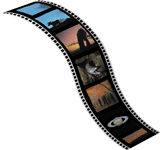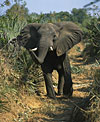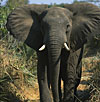|
After a long and tedious drive
across much of the southeastern quadrant of the country, we've
arrived at Zimbabwe's second largest but least visited National
Park, a vast 5000 square kilometer tract of wilderness bordering
war-torn Mozambique on the east and effectively buttressing
the well-known Kruger National Park in South Africa on the south.
We're too late for a game activity tonight, but awake early
(actually to some complaining -- are you kidding? -- when was
the next time you thought you'd be back here to enjoy the early
morning?) and pole across to the mainland and the Land Rovers.
Our accommodations are on an island at the confluence of the
Save and Runde rivers; hence the need to cross water. The eastern
channel of the Save is dry, and really looks much like a miniature
micro-area of the Kalahari desert, actually some 800 kilometers
to our west in Botswana. Driving over it to reach our island
definitely requires the use of 4-wheel-drive in low range. The
accommodations on the island are rather luxurious, consisting
of an open lodge, bar and dining area and 8 individual raised
thatched chalets (huts) with en-suite bathrooms, replete with
twin beds and hanging mosquito netting. This is typical of back-country
luxury in Africa, and is typical also of the strategy for visitation
of the remote game preserves and national parks. All in all,
it seems expensive, but when you factor in all food, drinks
and guiding it honestly becomes a splendid bargain.
Upon poling (required because the river is too shallow for motors
in midwinter, but cannot be traversed on foot because it is
thick with crocodiles!) across the western channel of the huge
Save river, our boatman lets us off for the short 50 meter walk
across the sandy and rock shoreline and up to the Land Rovers.
The process here is to drive about on very rugged jeep road
tracks while searching for big game. The guide and driver this
morning is Stephen Midzi (Learner Guide), an articulate, soft-spoken
and dignified young man of 20. Guides here in Zimbabwe must
complete a rigorous 5-year program of studies and field work
to become fully qualified in the back country. Fully qualified
is defined as one who has all the naturalist and ballistics
skills and can then guide both from the vehicle and armed on
foot. To receive your final diploma one must be on the ground
and participate in the kill of one of the "Big 5"
species. Much more on this in a later discourse on guiding;
suffice it now to say that there are often instances when such
rare big game (glorified by who might be described as western
tree-hugging environmentalists -- I've often been described
as same) needs to be managed and sometimes "culled"
(killed). This complex and controversial subject will be addressed
later as in the above-mentioned guiding and memory pieces.
We arrive at the Land Rovers and jump in. There are typically
2 or 3 long bench seats behind the cab, and a roll cage overhead.
The vehicle is open, allowing for full 360 degree viewing. It's
6 AM and cold, really just above freezing, not untypical for
wintertime in Zimbabwe. Because of the open vehicle we must
wear hats, heavy coats and even gloves. Most of the vehicles
are equipped with blankets as well. After a very short time
we encounter a honey badger in the middle of the "road."
This is a unique sighting, only possible because it is first
light. The honey badger is a nocturnal species and rarely seen.
I have a feeling it will be a good wildlife viewing day. Soon
a young bull elephant steps onto the middle of the road. This
encounter is different, though, than the encounters we've previously
experienced with elephants. [Note: Cheryl and I have already
been in the country for 10 days, having visited several national
parks and having had the privilege of observing a Total Solar
Eclipse from Rushinga, small rural community in northern Zimbabwe.
We've seen literally hundreds of elephants, but he is the first
one for the members of this particular tour.] This elephant
is upset; you can clearly perceive this in his behavior. His
ears are erect and stiff, his posture large and defiant -- we
are on his turf and he's not happy. Stephen also reacts differently
than the guides we've previously had. He guns the Land Rover
and drives right at the elephant. The elephant turns for a moment,
but then surprisingly turns back at us and executes a "mock
charge." The tourists (including us) are rather afraid;
this is a 5-ton animal we're challenging. The elephant eventually
recedes to the heavy undergrowth and low forest ecosystem that
we're in and Stephen explains that the elephants and wildlife
in this area "remember" a time when they were hunted
and poached (not altogether that long ago, perhaps 15 years
or less) and are rather nonplused by the intrusion of Land Rovers
in their "space." We encounter many other species
and have a wonderful morning wildlife experience, returning
eventually to the island for breakfast.
| We're
moved by the reaction of the animals we've encountered here
at Gona-Re-Zhou National Park. It seems they're very different
than the predictable and placid creatures (including lions!)
we've previously seen . . . |
We're moved by the reaction of
the animals we've encountered here at Gona-Re-Zhou National
Park. It seems they're very different than the predictable and
placid creatures (including lions!) we've previously seen [but
don't be lulled into a feeling of complacency -- we've learned
that all the creatures will respond very differently if you
change the silhouetted profile of the Land Rover (like standing
up, for example) and to leave the confines of the vehicle in
the presence of dangerous game would be lunacy]; there is something
very special about this place. I can't put my finger on it,
but it almost seems as though the animals here are the ones
acting naturally, whereas the previous encounters now seem to
have taken on a bit of a surreal staged appearance. My feelings
must just be pyscho-babble, I soon conclude.
| Japhet
incredibly desires to approach (the Buffalo) on foot, so
he maneuvers around them on various very rough tracks until
we're downwind of the great, almost primeval, creatures. |
We're off now a an additional
game drive, and after poling across the shallow river we again
mount our Land Rovers, this time with a different guide, Japhet
Diza. He actually is the Chief Guide and general manager of
Mahenye Lodge and is fully weapons-qualified. We drive about,
encountering additional elephants and tracks of both lions and
the elusive nocturnal leopard. Suddenly Japhet spots a large
herd of African Cape Buffalo, known as the most dangerous of
all the big game animals in Africa. It is said this is so because
of their unpredictability and herd instincts. When upset they
may charge en masse. Japhet incredibly desires to approach them
on foot, so he maneuvers around them on various very rough tracks
until we're downwind of the great, almost primeval, creatures.
(I can't perceive any wind!) We leave the Land Rover and proceed
on foot, Japhet (armed with a twin-chamber elephant gun) in
the lead. We approach carefully in complete silence, ducking
behind thick tree trunks along the way. As we approach from
perhaps 50 meters, we are instructed to crawl though the thick
grass, still moist from the morning dew. One of the tourons
quietly asks Japhet whether if the Buffalo react would it be
a good idea to stand? In perhaps his only display of negative
emotion during our stay in the remote and wild area, Japhet
very firmly notes: "Under no circumstance will you stand
up -- you will only stay low or crawl!" We approach to
within perhaps 20-25 meters and stop. The African Cape Buffalo
are a communal species, and herds are protected by the males,
who surround the group when threatened. Slowly each male (perhaps
dozens are members of this huge herd) move slowly to the front
to inspect the intruders -- us. They peer out over the heavy
grass and vegetation, looking (perhaps listening and smelling)
for our presence. They clearly know we're there, and we're not
one of those loud diesel machines that always stay on the track.
We're another species of animal, walking about near them, maybe
threatening them. But we're small -- close to the ground --
perhaps a group of warthogs or something. And, being downwind
(thank God!) we appear to possess no identifiable odor. One
by one the great male Buffalo come over to inspect. Then --
and finally -- the much larger dominant male (no need to ask
Japhet which one!) inches closer, perhaps to finally convince
the herd of our unharmful presence. Japhet motions that if I'm
very careful a few pictures are OK. How could he be so sure,
and what good is a two-chamber elephant gun if perhaps a hundred
Buffalo charge, I wonder? I do snap off several photographs
(I wish this camera made less noise, but at least there are
no electronic beeps, just mechanical noises) and we inch back
and somewhat out of range. We never do disturb the herd, and
the others in the second Land Rover are able to get a good look
as well. I remember thinking that I was very happy that Japhet
had finished all of his training and had been on the ground
during a hunt of one of these great creatures. After some additional
exciting encounters, we pole back over for lunch and conversation.
| One
by one the great male Buffalo come over to inspect. Then
-- and finally -- the much larger dominant male (no need
to ask Japhet which one!) inches closer, perhaps to finally
convince the herd of our unharmful presence. |
A new couple are additional visitors
to camp; it's now full -- 16 people -- very intimate. The man
is a South African and very experienced in the back country
all over Africa. I ask why he's chosen this place, and he replies
firmly and rather matter-of factly; "Well, I visit this
place because Gona-Re-Zhou is the wildest place in Africa. I've
been to all the parks in South Africa, East Africa, and even
here in Zim and Botswana -- this is the wildest place by far."
Later, we encounter day-vistors (very rare) who have an outfitting
background. They are scouting out the area for a possible trip.
"What do you think of this place?", I ask. The couple
responds, "We'll it's wild, but there is no game here.
We prefer the larger, more popular parks -- better facilities,
more access to game, all that stuff." Really.
That evening and throughout the rest of the trip we are haunted
by the scenes at Gona-Re-Zhou. Is it possible that we have experienced
one of the last truly wild places, where the animals are not
at all impressed with the human factor, where the game protests
such trivial human intrusions? Has the certainly rare and disappearing
wild-west guiding style of the impeccably prepared Japhet Diza
put us on the ground -- face to face -- with the most dangerous
game on the continent? Have we, through blind luck and a sense
of adventure, caressed the lips of the wildest place?
| Has
the certainly rare and disappearing wild-west guiding style
of the impeccably prepared Japhet Diza put us on the ground
-- face to face -- with the most dangerous game on the continent?
Have we, through blind luck and a sense of adventure, caressed
the lips of the wildest place? |
|






